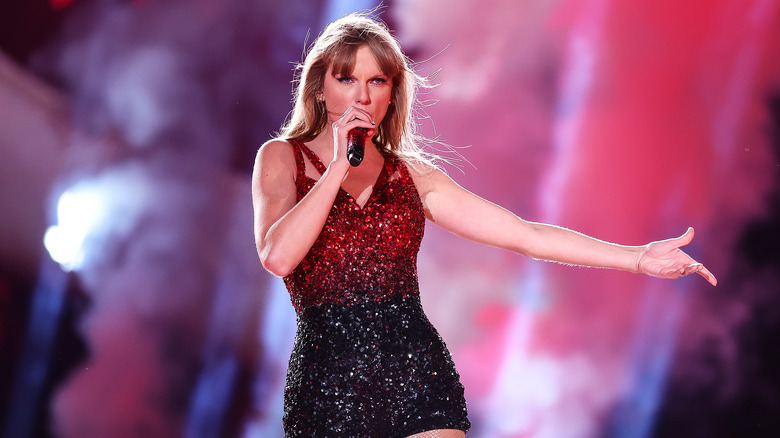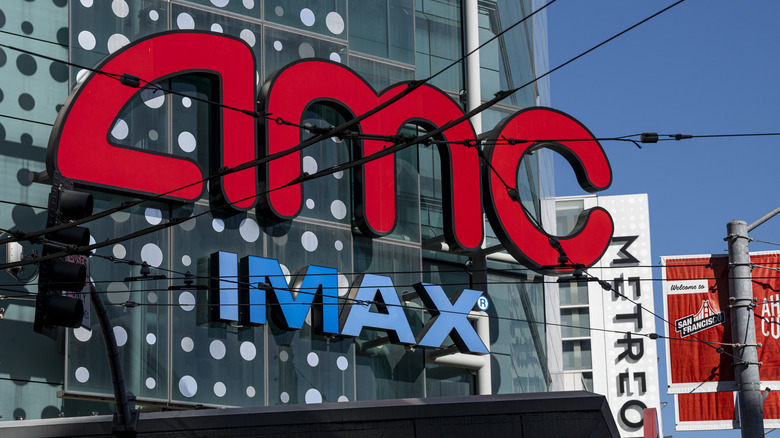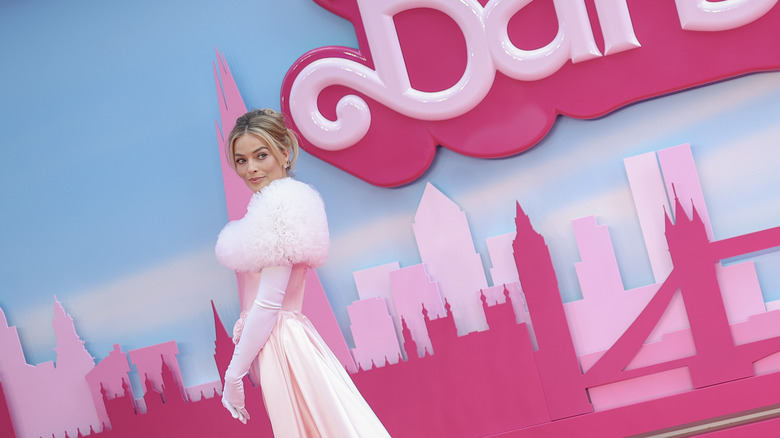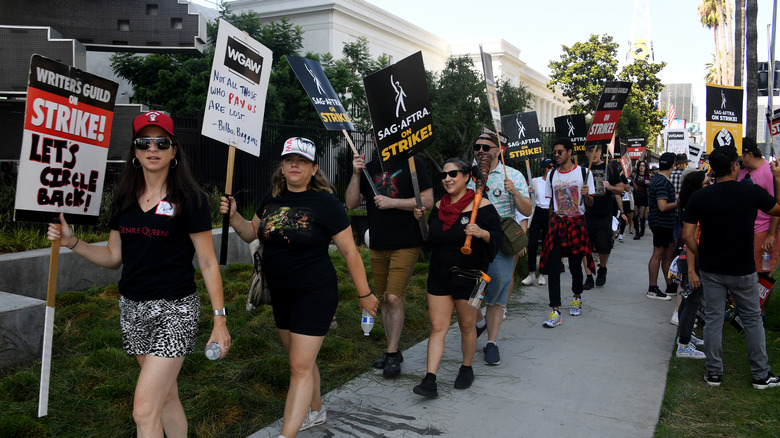Taylor Swift's Record Box Office Proves Movie Theaters Don't Need Big Studios
Taylor Swift is creating bad blood with major movie studios — and it could change a lot within the entertainment industry when all is said and done.
For the blissfully unaware, Swift has taken the world by storm in 2023 thanks in large part to her record-smashing career retrospective, the Eras Tour, which wrapped up its first leg in the United States in August 2023 and is currently taking a breather until she resumes performances this November in Argentina. Famously, getting tickets for the tour was essentially a great war, with Ticketmaster leaving millions of fans in the lurch — but on August 31, Swift made the surprise announcement that the concert film would come to North American movie theaters on October 13, 2023.
This move, to put it lightly, was huge. Other movies set to release that day promptly shifted their debuts, including the next "Exorcist" film. That said, the biggest box office bombshell to come out of the Taylor Swift situation is that Swift and her father reportedly inked their own distribution deal with AMC and Cinemark, leaving studios out of it completely.
So why is this such a big deal, and what does it mean for studios now — especially in a year that also saw a historical double-strike between the Writers Guild of America and the Screen Actors Guild?
Taylor Swift's success defies old theories that movie theaters would someday have to get purchased by studios
Let's go backward just a little bit to a different era — one where it seemed like well-funded studios could simply buy major multiplex chains and change the landscape of movie distribution altogether. As recently as March of 2023, Fox Business reported that Amazon's original founder, Jeff Bezos, was concocting a plan to purchase the entire fleet of AMC theaters... which would presumably mean that only Amazon original films or movies otherwise affiliated with the studio would be able to air at the chain's theaters.
So, this could clearly be a slippery slope if studios were to start buying out movie chains entirely. In an industry decimated by the COVID-19 pandemic, which shuttered theaters entirely for an extended period of time, it might seem like a great idea for a chain like AMC to simply take the money and run, but it would make the moviegoing experience that much more difficult for consumers as a result. If Amazon owns this chain and Disney owns another, narrowing precisely where specific movies are shown, it's easy to see how that turns into a mess for filmgoers, particularly more casual ones without an encyclopedic knowledge of IP — and that's without taking other studios like Warner Bros. and Sony into account.
Now, independent deals like Taylor Swift's could change everything
Now we need to get into the delicate details of Swift's deal with AMC. Reported by Matthew Belloni at Puck, the narrative appears to be that Swift and her team — which includes her former stockbroker father Scott — didn't feel like the deal offered by major studios was worth their time. Belloni reports that the Swift camp felt "disappointed" with offers made to them by the studios, and ultimately, AMC's CEO Adam Aron (a friend of Belloni, per the journalist's note) got a call from Scott Swift himself. Before long, the two had bypassed studios entirely. Belloni's report says that the Swifts put up between $10 and $20 million of their own money and hired director Sam Wrench to show up at the star's Eras Tour stops in Los Angeles to film, with the Swift and AMC taking in 53% of the eventual gross together and leaving theaters with 47%.
Per Belloni, studios are incredibly unhappy about the situation — which is unsurprising when you consider that the pre-sales for the Eras Tour film are blowing huge blockbusters like "Spider-Man: Across the Spider-Verse" out of the water, as well as the fact that studios had to adjust release dates to accommodate Swift. Ultimately, this takes agency away from studios and reminds other artists and theater chains that they can make magic happen themselves, interrupting other releases in the process. As Belloni put it, "Studios guard release dates zealously, but now AMC is saying: Beware, we're gonna acquire movies ourselves and drop them on your dates with no notice or consultation."
Even with studios involved, artists have proven their box office might in 2023
This isn't the first time that a well-regarded artist has shown studios their power this year — girl power, specifically. Before "Barbie" became one of Warner Bros.' biggest success stories in history, executive producer and star Margot Robbie made a huge bet on behalf of herself and writer-director Greta Gerwig and told the studios that if the movie's creative team got their way, the movie would succeed. Gerwig ended up being exactly right: the movie easily crossed $1 billion within just a few weeks of its release and ended up becoming the fastest-grossing Warner Bros. movie in history as well as 2023's biggest box office release (that figure, though, could end up being bested by Ms. Swift herself in October).
Even before "Barbie" came out, Mattel and Warner Bros. were nervous about the movie and found themselves balking at the jokes in it — but thanks to Robbie's fierce advocacy for a project that is, above all, unique, smart, and deeply thought-out by Gerwig, her entire team, and Robbie herself, it proved that the studios aren't really the ones succeeding in this story. Sure, Warner Bros. made a lot of money off of "Barbie," but so did Robbie, and the fact that the creative vision behind this movie is what made it succeed should make studios nervous when seen in combination with this Taylor Swift situation, to say nothing of widespread public approval for 2023's Hollywood strikes.
Taylor Swift - and the double strike - have taken power away from studios
The bottom line here is that studios haven't looked like the good guys for a hot minute now. Back in August, a Gallup poll indicated that over 70% of Americans agreed that both the WGA and SAG-AFTRA should be striking, and didn't support the fact that major studios seemed completely unwilling to bend to simple demands like "pay people the residuals they deserve" or "don't replace actual artists with artificial intelligence." Whether she intended to or not, Swift stood alongside the guilds by teaming up with AMC directly, because in doing so, she proved that an artist with capital can crush a system that was crushing its talent by not making their careers fully viable.
Swift isn't the only person in the entertainment industry with enough money to make her movies happen without major studios behind her, and perhaps this incredibly shrewd move will show other power players who aren't affiliated with studios or under their thumb in a real way that movies can be made without Warner Bros., Universal, Sony, or the like. Perhaps it's time for artists to take a cue from Swift, stare studios right in the eye, and say, "Look what you made us do."




